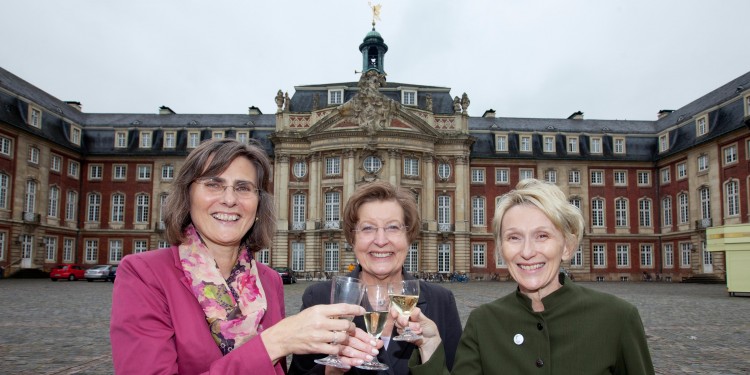
Twofold success in Excellence Initiative
A twofold success for Münster University (WWU) in the Excellence Initiative: the Approvals Committee of the German Research Foundation, the German Council of Science and the Humanities and the Ministers of Education and Science from the national and regional state governments decided today in Bonn to approve funding for two of the three WWU projects for which applications had been submitted. Both the new application for the "Cells in Motion" (CiM) Excellence Cluster and the application for an extension of the "Religion and Politics" Excellence Cluster, in existence since 2007, were both given a positive assessment. The application for funding for the "Evolution" Graduate School was not, however, approved by the assessors.
"This is a very good result, and it is above all a splendid success for our academics, who thereby receive recognition for their ideas and concepts", said Rector Prof. Ursula Nelles. "The fact that we now have Excellence Clusters in the fields of both the Humanities and Medicine and Natural Sciences shows that WWU is carrying out top-level research across the entire University."
In the "Cells in Motion" Excellence Cluster researchers are looking into the visualization and steering of cell behaviour in living organisms. The analysis of dynamic cellular processes (“Cells in Motion”) is of the greatest scientific and medical interest. If cells exhibit abnormal behaviour, illnesses are the result. CiM is based on the Cells in Motion Interfaculty Center (CiMIC), an association of academics from the fields of medicine, the natural sciences and mathematics at WWU as well as researchers from the Max-Planck Institute for Molecular Biomedicine in Münster. The spokeswoman for the Cluster is Prof. Lydia Sorokin, a patho-biochemist. The funding applied for up to and including 2017 amounts to around € 48 million.
In the "Religion and Politics" Excellence Cluster, set up in 2007, around 200 academics from 20 different subjects from the Humanities, Social Sciences and Law are working on the field of conflict between religion and politics. In this second pahse of funding they will be extending their innovative approaches to their research work to include new focuses such as the relationships between religion and gender and religion and economics, as well as transcultural interrelations. The spokeswoman for the Cluster is Prof. Barbara Stollberg-Rilinger, an historian. The funding applied for amounts to around € 45 million.
The background is as follows. In June 2009 The German national and regional state governments decided to extend the Excellence Initiative beyond 2012, for another five years with total funding of € 2.7 billion. On 1 September 2011, German Universities accordingly submitted a total of 143 applications for funding for the three funding sections contained in the programme: Graduate Schools to support junior academics, Excellence Clusters to promote top-level research, and general future-oriented concepts at universities.
The three applications submitted by WWU were preceded by a very intense selection process. In the end, 100 outlines were the result of a University-wide competition of ideas. The eight-member Research Advisory Board at Münster University and the Rectorate selected nine promising applications, of which three were shortlisted. The Rectorate is determined – despite the rejection received today – to pursue the ideas contained in the "Evolution" Graduate School. "We are convinced of the idea of using modern thinking about evolution as a unifying theoretical framework to enable new types of interdisciplinary research and teaching in a productive exchange of all the disciplines involved," said Prof. Stephan Ludwig, WWU Pro-Rector for Research.
